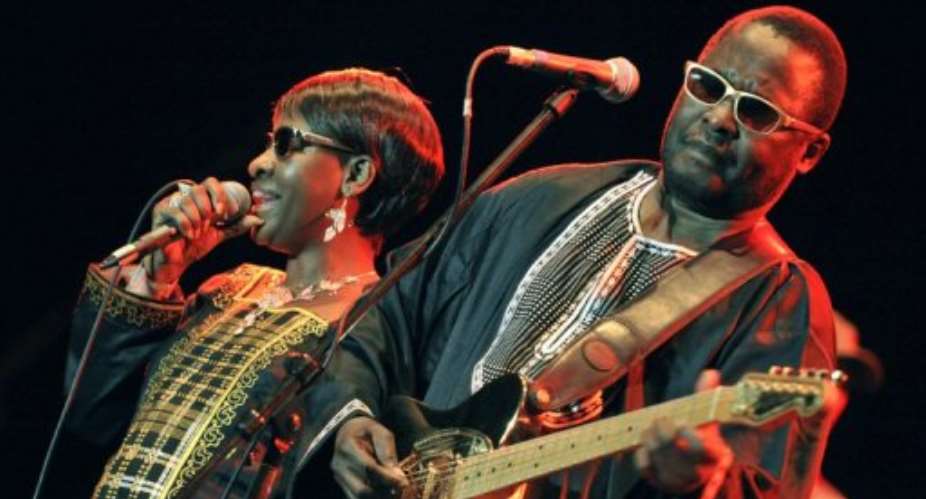PARIS (AFP) - Blind Afro-blues stars Amadou and Mariam travelled three continents, signing up TV On The Radio among the indie rockers guest-starring on their latest album "Folila", released in April.
Known for their fusion of styles and high-profile collaborations with the likes of Manu Chao or Damon Albarn of Blur and Gorillaz, the Malian couple told AFP the exchanges lent a universal angle to their songs.
"It's a way of saying music is without borders, that you can be an African and sing with an American, a Brit or a Frenchman," said guitarist Amadou Bagayoko, 57, who shares vocals -- and children -- with wife Mariam Doumbia, 53.
"Bringing them all together, with everyone expressing themselves in their own way, gives things a different colour."
The couple, who met in 1975 while learning Braille at Mali's Institute for the Young Blind in Bamako, shot to fame with the 2004 Grammy-nominated album "Dimanche a Bamako" or "Sunday in Bamako," which sold over 800,000 copies.
They have since performed for US President Barack Obama, recorded the official anthem for the 2006 World Cup finals in Germany and toured as an opening act for the American rock band Scissor Sisters.
Their music is a mix of West African instruments like the kora and balafon and western pop and blues elements, a reflection of traditional Mali sounds and the Pink Floyd and James Brown records from their youth.
They named their latest and eighth album "Folila" -- meaning simply "to play music" in bambara, one of Mali's national languages -- because so many artists lent a helping hand after meeting the couple at festivals over the years.
Recorded in New York, Bamako and Paris, the album features US rock band TV on the Radio, Jake Shears of the Scissor Sisters, and the singer/rapper Santigold.
It also -- more controversially -- stars the French rocker Bertrand Cantat, who was jailed for killing his girlfriend in 2003.
One of France's most popular indie singers as frontman of the band Noir Desir, or "Dark Desire", Cantat was convicted in March 2004 of killing French actress Marie Trintignant during a row in a hotel room in Lithuania.
Freed on parole in October 2007 and now working on what he calls a "very personal" solo album, Cantat met Amadou and Mariam at a 2009 concert in the port city of Bordeaux in southwestern France.
"We love rock and blues and we liked his voice a lot," Mariam said of Cantat, who the duo invited to Mali to layer his guitar and harmonica onto four of the album's tracks, including "Oh Amadou."
The video to the track shows the trio driving across Malian roads and its red earth and jamming around a campfire, Cantat with his harmonica and ear piercing and the blind couple in their trademark dark glasses.
"There are days of joy / there are days of woe / There are moments of pleasure / moments you must suffer," Amadou sings, to which Cantat adds the haunting, raspy chorus, "Oh Amadou, you don't have a choice / Oh Amadou, it's bigger than you."
"It's a song about giving people hope, about saying that life is made of highs and lows, days of joy and sorrow," said Bagayoko.
The simple lyrics are characteristic of the couple, whose stated goal is to convey essential messages in as straightforward a manner as possible, arguing that "people have a tendency to overcomplicate things."
A song like "Afrique, mon Afrique, "speaks of Africa and what we want for it: democracy, free elections, transparency, change," Bagayoko said, while the title "Dougou badia" deals with "the role of the artist and the joy he brings people."
Amadou and Mariam first performed while still students at the Institute for the Young Blind, singing songs to make others aware of the problems facing the handicapped and the blind.





 Lay KPMG audit report on SML-GRA contract before Parliament – Isaac Adongo tells...
Lay KPMG audit report on SML-GRA contract before Parliament – Isaac Adongo tells...
 Supervisor remanded for stabbing businessman with broken bottle and screwdriver
Supervisor remanded for stabbing businessman with broken bottle and screwdriver
 NDC watching EC and NPP closely on Returning Officer recruitment — Omane Boamah
NDC watching EC and NPP closely on Returning Officer recruitment — Omane Boamah
 Your decision to contest for president again is pathetic – Annoh-Dompreh blasts ...
Your decision to contest for president again is pathetic – Annoh-Dompreh blasts ...
 Election 2024: Security agencies ready to keep peace and secure the country — IG...
Election 2024: Security agencies ready to keep peace and secure the country — IG...
 People no longer place value in public basic schools; new uniforms, painting wil...
People no longer place value in public basic schools; new uniforms, painting wil...
 'Comedian' Paul Adom Otchere needs help – Sulemana Braimah
'Comedian' Paul Adom Otchere needs help – Sulemana Braimah
 Ejisu by-election: Only 33% of voters can be swayed by inducement — Global InfoA...
Ejisu by-election: Only 33% of voters can be swayed by inducement — Global InfoA...
 Minority will expose the beneficial owners of SML, recover funds paid to company...
Minority will expose the beneficial owners of SML, recover funds paid to company...
 Prof. Opoku-Agyemang has ‘decapitated’ the NPP’s strategies; don’t take them ser...
Prof. Opoku-Agyemang has ‘decapitated’ the NPP’s strategies; don’t take them ser...
